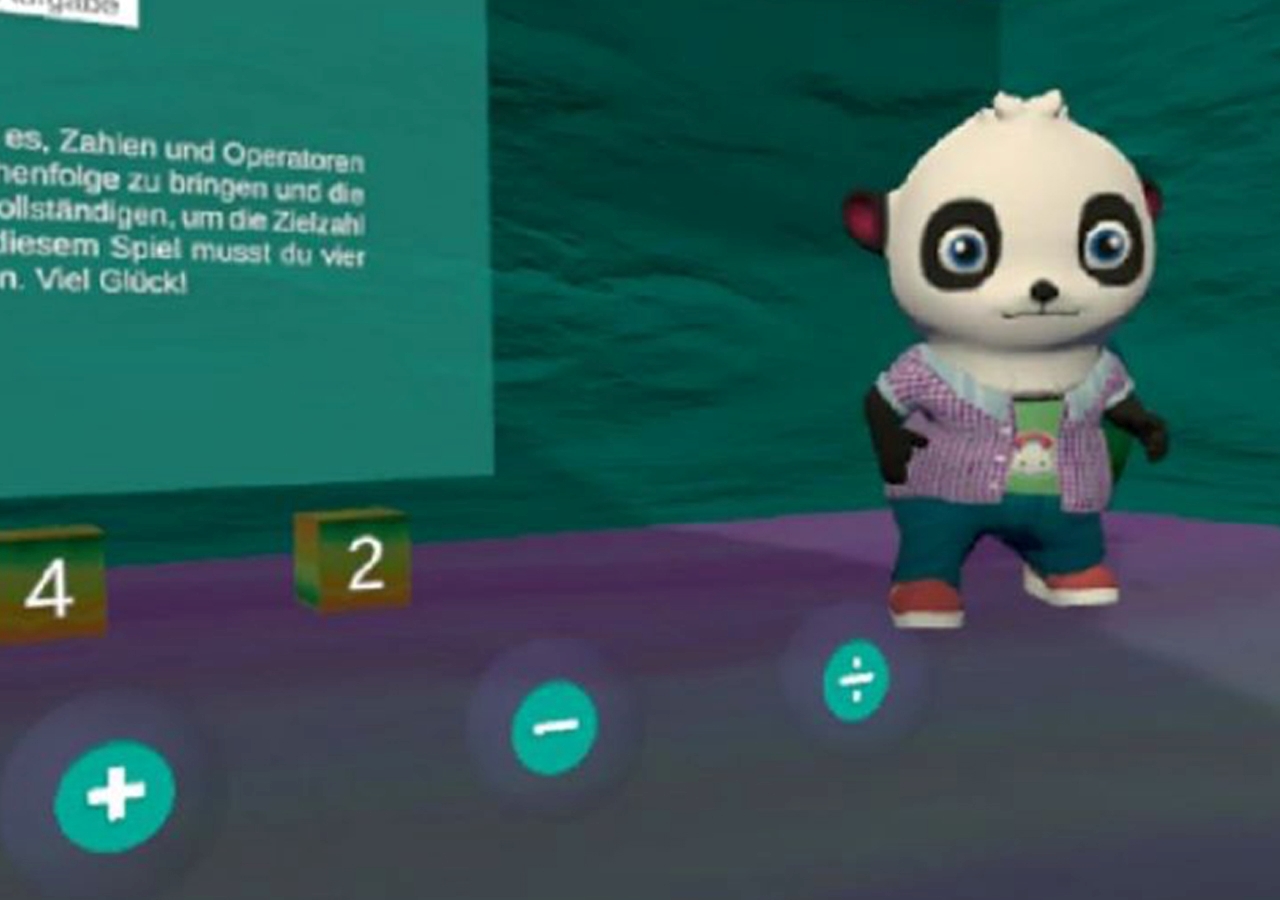Immersive Virtual Reality for Children in Formal Education
2020 – 2023

Summary
This PhD thesis explored the integration of virtual reality (VR) technology into formal education, specifically targeting school-aged children. While VR has gained traction primarily for entertainment, this study sought to harness its immersive potential for educational purposes within, for example, schools. Games have long been recognized as valuable tools for enhancing learning experiences. In recent years, schools have increasingly adopted them, particularly in subjects such as maths. Not all learning methods and tools are inclusive to all learners. Common challenges for children in a school context are inattention and hyperactivity. VR, with its ability to create immersive and customizable environments, presents an intriguing avenue for addressing these challenges.
To address this, a VR maths game was developed for this research, drawing from established educational frameworks and insights garnered from subject matter experts. Through qualitative interviews and thorough requirement analysis, the game’s design was refined. Subsequently, two user studies were conducted within real-world school environments.
The initial study focused on assessing usability and refining the prototype based on user feedback. Encouraging outcomes paved the way for a more extensive second study. This follow-up delved into the influence of a reward system and virtual agent on the user experience, and comparing the VR game against a non-VR counterpart. The findings demonstrated that the VR game not only cultivated positive user experiences but also heightened motivation and engagement.
Despite these promising results, further exploration is necessary to determine the role of ‘peerpresence’ in VR learning, and the game’s suitability for children with clinically diagnosed attention and hyperactivity issues. This research adds valuable insights into the process of creating inclusive and effective VR learning experiences. Through a comprehensive research approach, including design, usability testing, and user studies, the thesis underscored the potential of VR to enhance user engagement and experiences within educational contexts.
Acknowledgement
This study received funding from the University of Canterbury as part of the Applied Immersive Gaming Initiative (AIGI).
Researcher
Meike Belter
Supervisory Team
- Assoc. Prof. Heide Lukosch, HIT Lab NZ, University of Canterbury
- Prof. Robert Lindeman, HIT Lab NZ, University of Canterbury
- Assoc. Prof. Dean Sutherland, School of Psychology, Speech and Hearing, University of Canterbury
Research Outputs
- Belter, M. (2023). Immersive virtual reality for children in formal education [Doctoral thesis, University of Canterbury]. UC Research Repository. https://hdl.handle.net/10092/106837
- Belter, M., Wu, Y., Lukosch, H. (2023). Exploring the Use of Immersive Virtual Reality Games in a Formal School Environment. In: Harteveld, C., Sutherland, S., Troiano, G., Lukosch, H., Meijer, S. (eds) Simulation and Gaming for Social Impact. ISAGA 2022. Lecture Notes in Computer Science, vol 13622. Springer, Cham. https://doi.org/10.1007/978-3-031-37171-4_2.
- Belter M., Lukosch H., Lindeman RW., Wu Y. and Steinicke F. (2023) Exploring Virtual Reality (VR) to Foster Attention in Math Practice – Comparing a VR to a Non-VR Game. Lecture Notes in Computer Science: 3-16. Springer Nature Switzerland. http://dx.doi.org/10.1007/978-3-031-35979-8_1.
- Li C., Belter M., Liu J. and Lukosch H. (2023) Immersive Virtual Reality Enabled Interventions for Autism Spectrum Disorder: A Systematic Review and Meta-Analysis. Electronics (Switzerland) 12(11). http://dx.doi.org/10.3390/electronics12112497.
- Belter M. and Lukosch H. (2022) Towards a Virtual Reality Math Game for Learning In Schools-A User Study. In Proceedings – 2022 IEEE Conference on Virtual Reality and 3D User Interfaces Abstracts and Workshops, VRW 2022: 808-809. http://dx.doi.org/10.1109/VRW55335.2022.00255.
- Belter M. and Lukosch H. (2022) Virtual Reality Games for Children with ADHD in Formal Education. In Lecture Notes in Computer Science (including subseries Lecture Notes in Artificial Intelligence and Lecture Notes in Bioinformatics) 13219 LNCS: 211-220. http://dx.doi.org/10.1007/978-3-031-09959-5_18.
- Li RC., Belter M., Platt-Young Z. and Lukosch HK. (2022) Immersive Games for Neurodiversity and Mental Health in Children and Young Adults. Handbook of Research on Promoting Economic and Social Development Through Serious Games: 238-258.IGI Global. http://dx.doi.org/10.4018/978-1-7998-9732-3.ch012.
- Belter, M., Lukosch, H. (2022). Virtual Reality Games for Children with ADHD in Formal Education. In: Dhar, U., Dubey, J., Dumblekar, V., Meijer, S., Lukosch, H. (eds) Gaming, Simulation and Innovations: Challenges and Opportunities. ISAGA 2021. Lecture Notes in Computer Science, vol 13219. Springer, Cham. https://doi.org/10.1007/978-3-031-09959-5_18
